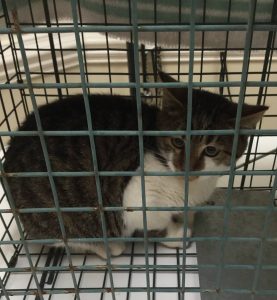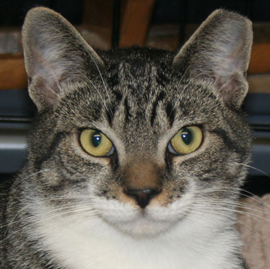What is the difference between a stray cat and a feral cat?
A “feral” cat is a cat who is not socialized to people, a wild cat. They tend to fear and keep their distance from humans. A “stray” cat used to have a home, but has become lost, abandoned, or otherwise lost its way. A stray cat usually still likes people and can usually be handled and adopted, but may be a little shy at first. This surgical program is intended for wild cats and homeless cats, NOT for your fur baby.

Why are you doing this?
In an effort to help curb the significant pet overpopulation in our area, Coastal Cat has instituted this program to help sterilize feral/stray cats. This is something that Coastal Cat is doing just to try to do what we can to help with a known and huge issue. We know we can’t help everyone, but we try to do what we can to contribute to the solution to the pet overpopulation issue in Onslow County. Most other veterinarians in the area are often not willing to even try to touch these cats. Please spay or neuter any cats you choose to feed. One cat can turn into hundreds in just a few years. And, if you feed ferals, they tend to be healthier and make even more kittens who survive better. This further complicates your overpopulation problem. Feed them if you like, but please spay and neuter first!
Can I spay/neuter my pet cat under this program?
These surgeries are NOT what we would recommend for your regular pet kitty. Please don’t try to get your pet cat spayed cheaper with this program. They won’t get pre-screening exams which reduce the risks of surgery and give you a chance to meet the doctor and ask any questions that you may have. Cats in this program will get the less expensive adjuvanted vaccines to help cut costs. They will not get the vastly superior pain medications provided with routine procedures. We have much better pain relief options available for cats who don’t have to be returned to fend for themselves in an unfriendly world hours after surgery. The type of cats we prefer to do this surgery on will probably never be touched again, but it will at least sterilize them and get them a rabies vaccine. No frills, but it gets the job done more affordably.
What is included with a feral program (TNR) surgery?
Feral spay/neuter surgery includes: spay or neuter, 1 year adjuvanted rabies vaccine, a distemper vaccine, and tipping of the left ear. All cats will be treated for fleas/ticks/ear mites an an additional cost since these parasites will travel to other cats in our facility. These services are required. They are all-inclusive in our pricing with the exception of the flea/anti-parasite product chosen to best cover the parasite burden of the cat when presented.
Example of an ear tip:

As part of the feral spay/neuter program, we will “tip” the left ear (as pictured above) at the time of surgery to signal to neighbors (and animal control) that this cat has already been spayed or neutered. The ear tipping is not negotiable with the feral-priced surgery. Ear tipping is also recognized world-wide as part of the trap-neuter-return (TNR) programs. This way the same cat will not be trapped repeatedly by other well-meaning individuals for another surgery. Also, Animal Control recognizes the trimmed ear as well and will not typically trap and destroy spayed/neutered ferals unless they become a public nuisance. This is a short video by Alley Cat Allies about TNR surgeries around the world.
What is NOT included in the TNR program?
You may add a la carte for an additional fee: combo testing for feline leukemia and feline aids. You may also add the safer (but more expensive) non-adjuvanted rabies vaccine, de-worming products, flea/tick prevention at additional cost. Fleas, in particular, will abandon one cat to jump onto others when the opportunity presents. So if you bring in a cat with fleas, you should expect that we will treat it (at additional cost to you). This is done so that we don’t have problems with fleas in the facility later. This will also give the recovering cat a month of relief from the fleas while recovering from surgery. If the TNR candidate has a problem, we can examine it and try to treat it while sedated for surgery. TNR surgeries do not come with a physical exam or other treatments. But those can be added by request at additional cost.
Do I need an appointment?
YES! You MUST schedule this in advance. PLEASE do not just show up with a feral cat in a trap. You may be disappointed. The very last thing we want is for you to blow your one chance at catching a wild cat and us not be able to help you. We may be closed or completely booked. Or we may have all of our spay packs used for the day. You probably won’t catch that cat ever again. Please schedule in advance.
Cats must arrive in a live trap or in a carrier/cage in good condition. A carrier must also be provided for the cat to recover in and return home. We do not want to recover a wild cat in a harsh wire trap to reduce the possibility of self-injuries. Inexpensive live traps are available for sale at places like Harbor Freight, Tractor Supply, and even Amazon.
I can get this done for less at the state funded clinic. Why?
We are not the least expensive feral spay/neuter program in the area for a few reasons. First, your tax dollars and license plate fees are not defraying costs here. We get no state or local funding. Second, we only have paid staff. There are no volunteers donating their time to get this done. Thirdly, we are a very small clinic, so we can’t assembly-line like a lot of other places do. Also, even with the higher-than-spay/neuter clinic pricing, we are still operating at a loss doing these surgeries. This is a Good Samaritan gesture to the community for all of the reasons listed above. Lastly, EVERY cat gets individual attention during their surgical anesthesia and recovery here, even the ferals. Hopefully we can help at least a few more cats get sterilized. They would otherwise be “littering” the county.
Please call our staff to discuss options and pricing during regular office hours.
